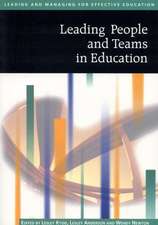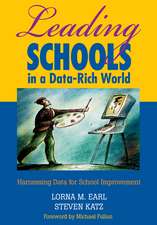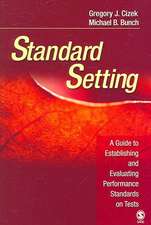Doubling Student Performance: . . . And Finding the Resources to Do It
Editat de Allan R. Odden, Sarah J. Archibalden Limba Engleză Paperback – 22 mar 2009
Preț: 268.25 lei
Nou
51.33€ • 53.04$ • 42.70£
Carte disponibilă
Livrare economică 27 februarie-13 martie
Livrare express 12-18 februarie pentru 26.94 lei
Specificații
ISBN-10: 1412969638
Pagini: 184
Dimensiuni: 178 x 254 x 18 mm
Greutate: 0.39 kg
Ediția:1
Editura: SAGE Publications
Colecția Corwin
Locul publicării:Thousand Oaks, United States
Recenzii
"The authors strike a balance between research-based practices and evidence from real schools. The chapter outlining the 10 steps was especially useful because it allows the reader to take a mental inventory of what he or she already has under way and what may come next. Three additional chapters—on smaller class size, professional development and extra help for students—serve as case studies with the key concept that funding possibilities are endless when you look for them."
"This is a must-read book for state, district, and school leaders. It reaffirms the good work that is happening in many, many places in our country and describes the strategies and use of resources that make a significant difference in student achievement."
"In my work, I see evidence of the power of good schools to change young lives for the better almost every day. This book takes us behind the doors of unusually high-performing, high-poverty schools to show us how they do that, and where they get the funding to support their programs. The book is a valuable tool for educators who want to improve their results and a reminder to parents and policy makers that we should never expect less."
Cuprins
Preface
1. Places That Have Doubled Student Performance
Rural Districts and Schools that have Doubled Perfo
Rosalia, Washington
Abbotsford, Wisconsin
Doubling Student Performance at the Advanced Level: Monroe, Wisconsin
Monroe school district improvement process
Other Rural Examples
Medium Sized Districts
The Madison, Wisconsin Story
Kennewick, Washington
LaCrosse, Wisconsin
Columbus School in Appleton, Wisconsin
Doubling Performance in High Minority, High Poverty Schools
2. The Stimulus for Change and the Educational Change Process
Pressure from Multiple Sources to Improve Student Achievement
Pressure from State-Standards Based Reform
Pressure from District Administrators
Pressure from Within the School
Pressure from the Federal Government
The Large-Scale Organizational Change Process
Laying the Foundation for Change
Creating a New Educational Strategy
Implementation, Monitoring and Continuous Improvement
3. Ten Steps to Double Student Performance
Step 1: Understanding the Performance Problem and Challenge
Step 2: Set Ambitious Goals
Step 3: Change the Curriculum Program and Create a New Instructional Vision
Step 4: Formative Assessments and Data-Based Decision-Making
Step 5: Ongoing, Intensive Professional Development
Step 6: Using Time Efficiently and Effectively
Step 7: Extending Learning Time for Struggling Students
Step 8: Collaborative, Professional Culture
Step 9: Widespread and Distributed Instructional Leadership
Step 10: Professional and Best Practices
Summary and Conclusions
4. Reducing Class Size
Resources at School Sites
Reallocating Resources to Reduce Elementary Class Size
School-Wide Strategies to Reduce Class Sizes
A District wide Strategy to Reduce Class Size in Early Elementary Grades
Summary
5. Finding Resources for Professional Development
Resources Needed for an Effective Professional Development Program
A Professional Development Fiscal and Program Audit
Doubling Performance Districts
Using Extant Professional Development Days Effectively
Planning and Professional Development Time
Summary
6. Funding Extra-Help Strategies
Individual and Small-Group Tutoring for Struggling Students
Extended Time for Struggling Students to Learn the Core Curriculum
Summer School Program Focused on Core Instruction
7. Linking Resources Needed to Double Performance
Finance Adequacy
Approaches to School Finance Adequacy
Evidence-Based Approach to School Finance Adequacy
References
Index
Notă biografică
Allan Odden is Co-Director of Strategic Management of Human Capital (SMHC) in public education, a project of the Consortium for Policy Research in Education (CPRE). SMHC seeks to improve student performance through talented teachers and school leaders and improved instructional practices produced by SMHC, focusing initially on large urban districts. He also is Professor of Educational Leadership and Policy Analysis at the University of Wisconsin-Madison. He also is Co-Director of the Consortium for Policy Research in Education (CPRE). CPRE is a consortium of the University of Wisconsin-Madison, Pennsylvania, Harvard, Michigan, Northwestern, Teachers College-Columbia University, and Stanford Universities. He formerly was professor of education policy and administration at the University of Southern California (1984-1993) and Director of Policy Analysis for California Education (PACE), an education policy consortium of USC, Stanford and the University of California, Berkeley.
He is an international expert on the management of human capital in education, teacher compensation, education finance, school-based financing, resource allocation and use, educational policy, school-based management, and educational policy implementation. He worked with the Education Commission of the States for a decade, serving as assistant executive director, director of policy analysis and research, and director of its educational finance center. He was president of the American Educational Finance Association in 1979-80 and received AEFA's distinguished Service Award in 1998. He served as research director for special state educational finance projects in Connecticut (1974-75), Missouri (1975-77), South Dakota (1975-77), New York (1979-81), Texas (1988), New Jersey (1991), Missouri (1992-93), the Joint Interim Task Force on School Finance Adequacy in Arkansas (2003, 2005), the Wyoming Select Committee on Finance (2005), Washington Learns (2006) and Wisconsin (2005-2007). He was appointed Special Court Master to the Remand Judge in the New Jersey Abbott v. Burke school finance court case for 1997 and 1998. He has worked on teacher compensation changes in dozens of states and districts,. He currently is directing research projects on school finance adequacy, school finance redesign, resource reallocation in schools, the costs of instructional improvement, teacher compensation and the strategic management of human capital in public education. Odden has written widely, publishing over 200 journal articles, book chapters, and research reports, and 32 books and monographs. He has consulted for governors, state legislators, chief state school officers, national and local unions, The National Alliance for Business, the Business Roundtable, New American Schools, the U.S. Congress, the U.S. Secretary of Education, many local school districts, the state departments of education in Victoria and Queensland, Australia, and the Department for Education and Employment in England.
His most recent books include School Finance: A Policy Perspective (McGraw Hill, 2008, 4th edition), with Lawrence O. Picus and How to Create World Class Teacher Compensation (Freeload Press, 2007) with Marc Wallace. Other books include Paying Teachers for What They Know and Do: New and Smarter Compensation Strategies to Improve Schools (Corwin Press, 1997, 2nd Edition, 2002) with Carolyn Kelley; Reallocating Resources: How to Boost Student Achievement Without Spending More (Corwin, 2001) with Sarah Archibald; School Finance: A Policy Perspective (McGraw Hill, 1992, 2nd Edition, 2000, 3rd Edition 2004) co-authored with Lawrence Picus; School-Based Finance (Corwin Press, 1999), edited with Margaret Goertz; Financing Schools for High Performance: Strategies for Improving the Use of Educational Resources (Jossey Bass, 1998) with Carolyn Busch; Educational Leadership for America's Schools (McGraw Hill, 1995); Rethinking School Finance: An Agenda for the 1990s (Jossey-Bass, 1992); Education Policy Implementation (State University of New York Press, 1991); and School Finance and School Improvement: Linkages for the 1980s (Ballinger, 1983).
He was a mathematics teacher and curriculum developer in New York City's East Harlem for 5 years. He received his Ph.D. and M.A. degrees from Columbia University, a Masters of Divinity from the Union Theological Seminary and his B.S. in aerospace engineering from Brown University. He is married, has two children, and one grand child.











